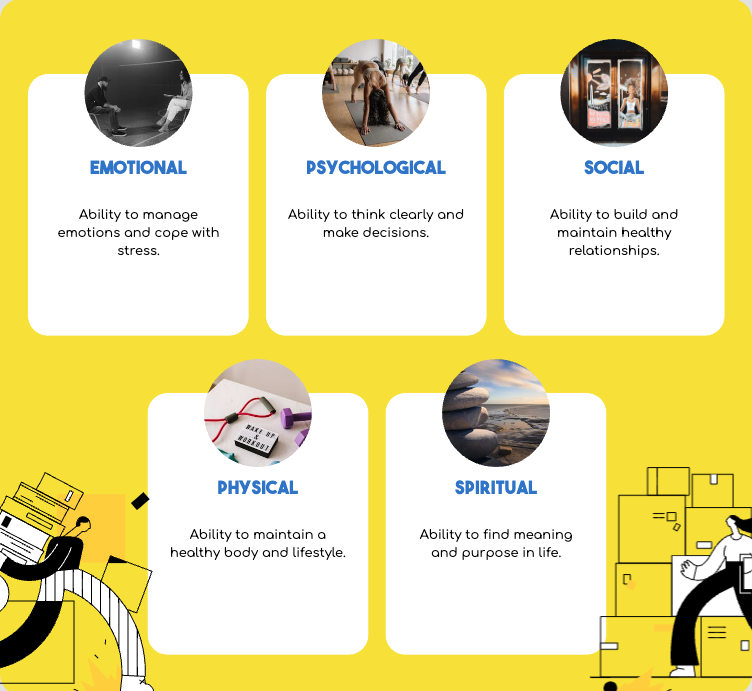Understanding and prioritizing mental wellness is crucial for leading a fulfilling life. While the importance of physical health is widely acknowledged, mental health often remains an overlooked aspect of our well-being. However, mental health is integral to our overall health, influencing everything from our physical condition to our relationships, professional success, and personal happiness. Unlocking the Power of Mental Health begins with grasping the full impact of mental wellness and exploring what it means to be mentally healthy.
Defining Mental Health
Mental health is the foundation of our emotional, psychological, and social well-being. It is about how we think, feel, and behave. The World Health Organization says It is an integral component of health and well-being that underpins our individual and collective abilities to make decisions, build relationships and shape the world we live in. Mental health is a basic human right. And it is crucial to personal, community and socio-economic development.
Mental illnesses, conversely, include conditions that affect mood, thinking, and behavior. These conditions have diverse causes, with genetics and family history being notable factors. Mental health professionals, including psychiatrists, psychologists, and counselors, play a vital role in supporting individuals experiencing mental health challenges.
Why Mental Health Matters
Mental health is crucial because it intertwines with every facet of life, influencing our thoughts, emotions, and actions. It serves as the bedrock for our emotional and psychological well-being, enabling us to realize our potential, navigate the stresses of life, and contribute productively to society. The significance of mental health extends beyond the mind to affect physical health; poor mental health can precipitate physical illnesses, while good mental health can bolster physical resilience and recovery. It shapes our ability to forge and sustain relationships, fostering communication and empathy necessary for connecting with others. Additionally, mental health is integral to our resilience, equipping us with the tools to cope with challenges and rebound from adversity. In the realms of work and education, mental health impacts our performance and efficiency, influencing productivity and financial stability. Thus, mental health is not just an individual concern but a cornerstone of community well-being and societal progress
Real World Client Scenario
Alex, a software developer in her early 30s, had always prided herself on her ability to handle pressure. However, over the past year, the combination of long hours, tight project deadlines, and the blur between work and home life began to take its toll. She noticed a decline in her productivity, felt constantly tired, and found herself less engaged with friends and family. Recognizing these as signs that her mental well-being was at risk, Alex decided to take proactive steps toward improving her mental health.
First, she established a clear boundary between work and personal life by setting specific work hours and creating a dedicated workspace at home. She also began practicing mindfulness meditation for 10 minutes each morning, which helped her start the day with a clearer mind and a calmer disposition. To address her physical health, which she knew was interconnected with her mental well-being, Alex incorporated regular exercise into her routine, going for a run or a bike ride after work.
Realizing the importance of social connections, Alex made a conscious effort to reach out to friends and family, scheduling weekly video calls with those who lived far away and meeting up with local friends for coffee or a walk in the park. She also sought the help of a therapist to talk through her feelings of burnout and to develop healthier coping strategies for stress.
Within a few months, Alex noticed significant improvements. She felt more energetic and motivated, her concentration and efficiency at work improved, and she found greater satisfaction in her projects. Her relationships also benefited from her improved mood and the renewed effort she was putting into them. Most importantly, Alex learned the value of taking time to care for her mental health, realizing it was not just about avoiding negative outcomes but about actively creating a more fulfilling and balanced life.
The Three Components of Mental Health
Alex has taken significant steps to improve her life by addressing the three components of mental health: emotional, psychological, and social well-being. Her approach to each component demonstrates a holistic understanding of mental health and the interconnectedness of these aspects in achieving overall wellness.
Emotional Well-being
Alex has initiated practices aimed directly at enhancing her emotional well-being. By engaging in mindfulness meditation each morning, she cultivates a state of calm and presence, which helps her manage her emotions throughout the day. This practice is crucial for developing emotional resilience, allowing her to better cope with stress and challenges. Additionally, Alex’s decision to seek therapy provides her with a safe space to explore and understand her emotions, learn healthy coping mechanisms, and develop strategies for managing feelings of burnout. These steps are instrumental in improving her emotional regulation and overall emotional health.
Psychological Well-being
To bolster her psychological well-being, Alex has implemented several key changes. Establishing clear boundaries between work and personal life helps prevent mental exhaustion and maintains her psychological resources. This act of setting limits is a form of self-care that preserves her mental energy, allowing for better concentration and problem-solving abilities. Regular exercise, by improving physical health, also has a profound effect on psychological well-being. Physical activity is known to reduce symptoms of anxiety and depression and improve mood through the release of endorphins, contributing to clearer thinking and better mental performance.
Social Well-being
Alex understands the importance of social connections in maintaining mental health. By reaching out to friends and family, scheduling regular interactions, and ensuring she maintains these relationships, Alex works on her social well-being. These actions help her feel connected, supported, and valued, which are vital aspects of social health. Engaging in social activities, even simple ones like coffee meetups or video calls, can significantly improve one’s sense of belonging and provide emotional support, contributing to a healthier, more fulfilling life.
By addressing these three components of mental health, Alex is not only working towards resolving her current feelings of burnout but is also laying a foundation for a more resilient and satisfying life. Her comprehensive approach serves as a model for how individuals can proactively manage their mental health through targeted actions that nurture emotional stability, psychological clarity, and social connectivity.
How Alex Can Maintain Her Mental Health
To maintain her improved mental health, Alex should continue practicing self-care, including mindfulness meditation and regular exercise, while ensuring she meets her basic needs for a balanced diet and sufficient sleep. Stress management is crucial, so recognizing and preparing for triggers, alongside maintaining work-life boundaries and periodically disconnecting from digital devices, will help prevent burnout. Keeping up with social connections, pursuing new skills and hobbies, and engaging in community activities can enrich Alex’s life and foster a sense of belonging. Ongoing learning about mental health, coupled with regular check-ins with a therapist and health monitoring, can provide insights and support. Finally, engaging in self-reflection and gratitude practices can enhance Alex’s overall perspective and emotional well-being. By integrating these strategies into her daily life, Alex can not only sustain but also build upon her mental health progress.
Mental Health Assistance in the Denver Area
Mental health is as critical as physical health to our overall well-being. It’s time to elevate the conversation around mental wellness, removing stigmas and encouraging open discussions. Taking care of our mental health is not optional; it’s essential for living a balanced, productive, and happy life.
If you or someone you know is grappling with mental health issues, it’s important to recognize that there is a path to recovery. At Self Care Impact, we are dedicated to supporting individuals through the journey of improving your mental health.
Take a look at our Depression Treatment Page for more information. Then we invite you to call us at 720-551-4553 for a free 20-minute phone consultation with a specialisst. You can schedule your appointment via phone, or the contact page on our website. We look forward to hearing from you.
Self Care Impact Counseling envisions a new age of counseling for adolescents, adults, couples & groups that makes a REAL difference with core values of GROWTH | BALANCE | COMPASSION | INNER HARMONY.


